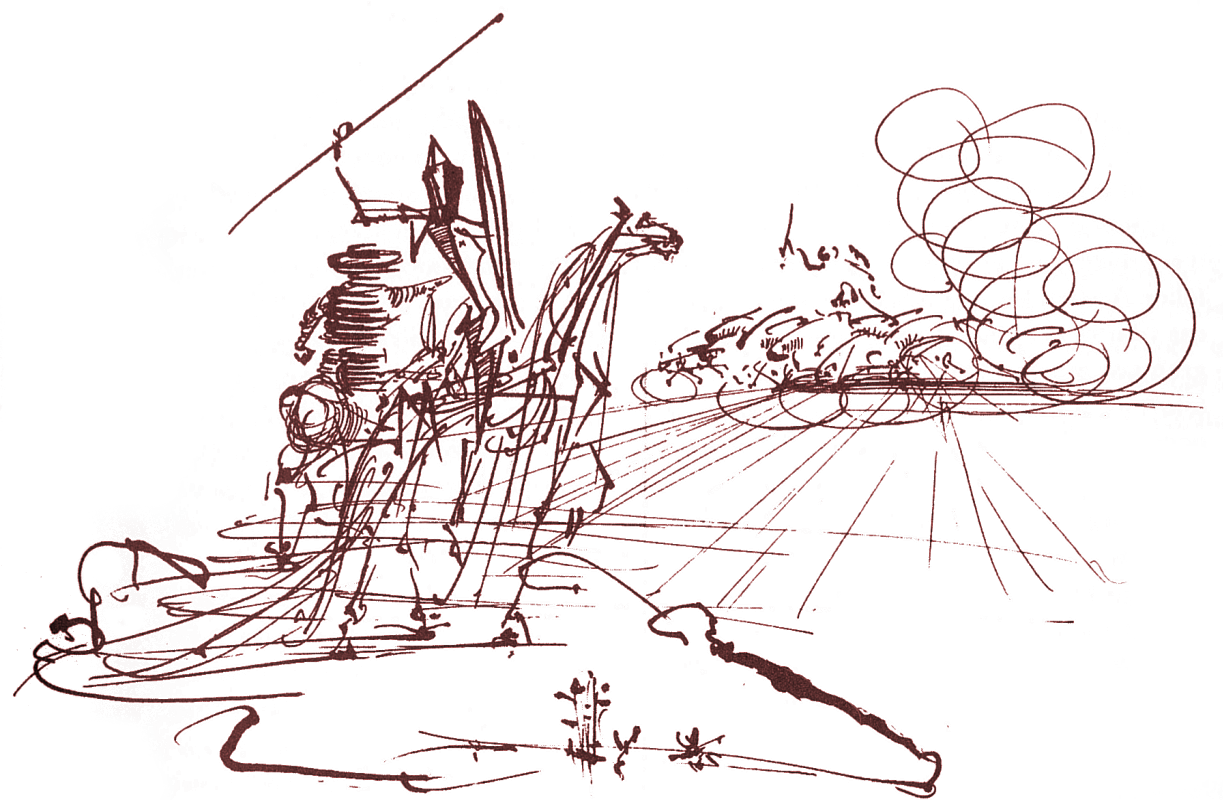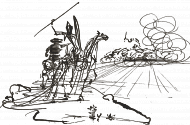“People think television is a revolutionary invention, but it’s also a revolutionary experiment in consciousness that’s not all good.” – Thomas Doane-Swanson
It’s funny how a concept or idea, once stuck to a thing, clings there with unshakable tenacity and thereafter lends its own peculiarities to the thing itself.
I am reminded of the Kabbalists who sought the true name of Yahweh, a talisman more sacred than the Holy Grail. Are they seeking a mere designator? No, they seek to uncover the very God Himself, as though name itself was a scale model.
And, like God, I, too have gone by an ersatz. For a long time I was “Harry Potter”: shy & quiet. Over time, I have gradually come into my own. Being myself has taken a measure of courage, especially in this tumult of alien cultures. Gradually, the nickname lost its power over me and I regained my spirit. (The power of a name.)
(An alternate for the fantasy-minded: Long I walked through darkness, as daemon roar sapped by strength. Their constant insinuation intruded upon and subtly corrupted my inner clockworks. I was lost to myself, as lost as I was to time; and with my self fled my name. They drew me to them and called me a new thing. Their discourse was of vulgarity, and they would mock and jeer me often. But I did not respond, so intent was I upon remembrance. I was like an alchemist who again and again repeats the same experiment yet results confound calculation. Yet it is the glass itself which time and again corrupts the product.
And so it was, as they prodded at me, that my rage welled up inside me. The fire of my denunciation burned away their falsehoods and my name itself.
For it was my distraction that confounded me, a searching for a thing which was lost in the very quest to find.)
Oh, yeah, and i got a haircut so i quit looking so much like Harry Potter.
Would the timbre of this place change if it were called “Protracted Men’s Retreat”? The name “Federal Prison Camp” spurs on such opinions as “Why did they put up those [partial] fences? I mean, this is a camp for chrissakes.”
Names persuade action, but actions inculcate thoughts as well. Particularly as we move through limited spheres of action, our thoughts tend to limit themselves. For the Zen monk, the repetition of action frees the mind from attention to the trivialities of the mundane. This, however, is a willful act in the face of the deadening which is generally induced. (The bacchant inverts the monk’s formula: through variety of action he stills the mind through strangulation, for otherwise it would leap up and devour him.) For the mind may often mimic the body and follow action’s repetitious mimesis down the same trails of definitions, concepts and names, while side paths choke and fester with disuse. The reasoning of these paths is long since forgotten (as the legs of a table vanish mysteriously, yet just as mysteriously it floats and the family continues to dine thereupon.) And when premises disappear, the path becomes unassailable: it exists because it exists. And what has verisimilitude like the proof by tautology?
When the mind is curiously intractable from the front, change must be undertaken by the back way: the subconscious. Most people imagine that television is free. Your subconscious real estate is the payment: your mind is plowed (programming) and seeded (commercials). Billboards spring up and people your subconscious, demented Jiminy Crickets which remind the self of its duties to itself and to the economy. And, through these friendly reminders, it habituates the pathways of thought. The tracery of the thoroughly habituated mind is like the living funeral of the coral reef: the record of what once lived. These husks of thought are brittle: snapping, tearing, or breaking, but utterly unyielding to the frontal assault of reason: they defy it. These paths of thought are susceptible only to the slow corruption of the subconscious, for this is where the roots of thought lie, amongst the reflexes. Television is a subtle corrosion.
Environment works upon the mind in much the same way. The interplay between environment and mind is one that strives for harmony. Mindset and environment do not naturally tolerate contradiction. The mind synchronizes to the environment, unless through effort the mind flexes and moves against the currents of mood that pull upon it. (Stronger still is the mind which diverts the currents themselves through its surgings.) Regardless of the mind’s simulation of a pleasant experience, the bald fact of prison life re-iterates itself between paroxysms of will.
Prison can be like a hospital in which patients cross-pollinate diseases (or, for the mind which resists the flows of influence, it can be a place to define oneself contra-criminal, to cast off this lecherous confederacy of criminality.)
There is a curious malaise of thought that begins to set in, born of apathy, perhaps, and the doldrum of repetition. The sheer futility of any action: all of the jobs are hopelessly overstaffed and badly planned and managed to boot. An idleness sets in, and afterwards the mind, too, begins to doubt its worth. This is the stagnation caused by the repetition of futility: the hamster wheel. The battle for sanity is the battle for the spirit and the subconscious.
Those that become enwrapped in the smallish niceties of prison (illicit hamburgers and bits of candy) in order to escape the existential wastes of prison life are like worms who over-cocoon themselves and suffocate before turning to butterflies.
Let’s see . . . these weeks I have read “Galapogos” by Kurt Vonnegut, “Snow Falling on Cedars” by David Guterson, and Rowling’s “Harry Potter and the Prison of Azkaban”. I also read Edward Said’s “Orientalism”: a book about how accidental scholars built up a self-consistent body of work in reference to the Orient that was founded in colonial elitism. This “Scholastic” cultural legacy, which was overtly politically assertive of Western cultural and racial superiority (which was grossly misrepresentational and needlessly exoticizing) continues to impact western scholars’ views on the Orient today. And so you have the “Christian” right’s version of Islam, which proliferates in ignorance. (And so, the definitions affect the thing . . . )
I also read “Richard II” by Shakespeare. I really love Shakespeare. And “The Life of Pi” by Yann Martel, a really great book also. Did I mention that last week I read “The Theft” by Saul Bellow? Well, maybe it is important that i did. I read part of “Critique of Everyday Life” by Henri Lefevre: who said “Man must be everyday, or not at all.” Meaning that if man’s political life is to change, then the details of everyday life must change. He was a Situationist.
I have heard some complaints that my letters are basically incoherent intellectual ramblings, and not a day-to-day update, as such things generally are. This is true, though to me, what I talk about is what is happening. What I’m reading and thinking are the things which shape and mold me, and this inner dialogue is the stuff of everyday life. If you don’t like it, maybe posterity will.
Yours truly,
Jeremiah



